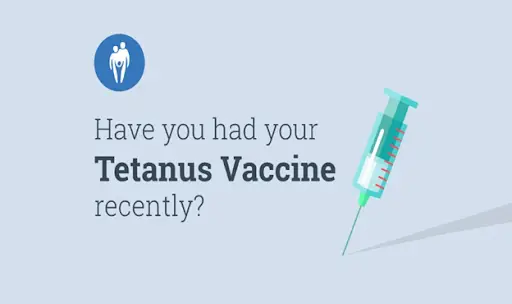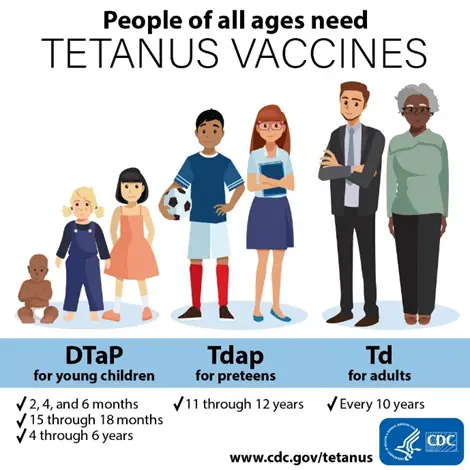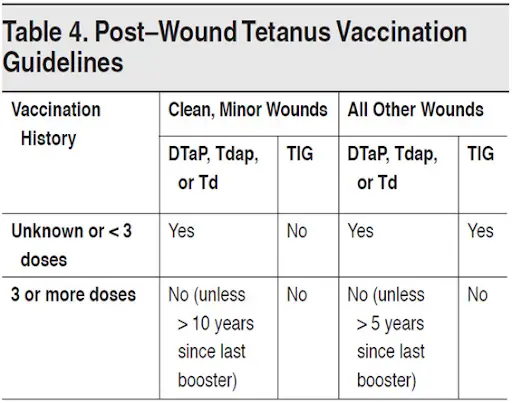Tetanus Vaccine
Get In Touch
Call Now
Monday to Friday
9:00 AM To 6:00 PM
Saturday and Sunday
Closed

- Tetanus is an infection caused by Clostridium, which is also referred to as lockjaw. There are four kinds of vaccines used today to protect
- Tetanus is a bacterial infection that causes painful muscle spasms and can lead to death.
- The Tetanus vaccine has made tetanus a preventable disease.
- You can get it through a cut or other wound.
- Tetanus bacteria are commonly present in soil, dust, and manure.
- The tetanus bacteria can infect a person even through a tiny scratch. But you are more likely to get tetanus through deep punctures from wounds created by nails or knives.
- The bacteria travel via blood or nerves to the central nervous system.

Symptoms of Tetanus
- Tetanus symptoms result from a toxin produced by tetanus bacteria.
- Symptoms often begin around a week after infection. But this may range from three days to three weeks or even longer.
- The most common symptom is a stiff jaw, which can become “locked.” This is how the disease came to be called lockjaw.
- Symptoms of tetanus may include:
- Headache
- Muscle stiffness, starting in the jaw, then the neck and the arms, legs, or abdomen
- Trouble swallowing
- Restlessness and irritability
- Sweating and fever
- Palpitations and high blood pressure
- Muscle spasms in the face, causing a strange-looking steady smile or grin
- If not treated, tetanus can cause death from suffocation.

Vaccination Schedule
- You normally receive tetanus shots in the deltoid (shoulder) muscle.
- If you did not receive a tetanus vaccine as a child, you should
- start with a three-dose primary series with the first dose being a three-in-one combination called Tdap that protects against tetanus, diphtheria (Td) and pertussis (whooping cough).
- The other two doses are a dual vaccine (Td) cover tetanus and diphtheria.
- You receive these vaccines over a period of seven to 12 months.
- Vaccination against pertussis is especially important for those in direct contact with young infants or patients.
- After receiving the primary series, get a Td booster every 10 years.
Treatments for Tetanus?
- If tetanus does develop, seek hospital treatment immediately. This includes wound care, a course of antibiotics, and an injection of tetanus antitoxin.
- You may receive medications such as chlorpromazine or diazepam to control muscle spasms, or a short-acting barbiturate for sedation. You may require the aid of an artificial respirator or other life-support measures during the several weeks needed for the disease to run its course.
- 1. Admit the patient to a quiet room in an intensive care department . Try to monitor the patient with minimum possible stimulation. Avoid light …
- 2. Explore the wound, clean it thoroughly and debride to get rid of dead and infectious tissue.
- 3. Give injection Benzyl penicillin 500000 units intravenous every 6 hour for 10 days.
- 4. Neutralize the circulating or unbound toxin. Give a single dose of tetanus immune globulin (TIG) 3000 IU intramuscular.
- 5. To avoid spasms, give injection diazepam (injection valium) 100 mg in 500-1000 ml of dextrose water.

Long term effects of tetanus?
- Complete recovery from a tetanus infection requires new nerve endings to grow, which can take up to several months.
- Complications of tetanus infection may include:
- Broken bones. The severity of spasms may cause the spine and other bones to break.
- Blockage of a lung artery (pulmonary embolism).
What Patients Say
Our Testimonials
Why patients trust Dr. Farah with their health

Came in with a headache and started to feel sick. Had a big trip for New Years, therefore I had to solve my problems quickly. Dr. Farah helped me right away and treated all my problems, he saved my weekend. Will come here again soon.
Melanie Warner

I was in a lot of pain and I walked in and the receptionist was so lovely. I was into see the doctor within five minutes and he listened to me and was wonderful. I’ve been to a few urgent cares and this one by far is the best !
Tiffany Lee-Frank

I absolutely love Dr Farah and his whole staff on the medical and the spa side. I’m not just saying this, Dr Farah has been my doctor over 10 years and I’ve been using his Rejuvenate spa for about 4 years now. I would give them 10 stars if I could!!!
Lori Brooks

Ashley and Anna are friendly and made me feel welcome and at ease. Dr. Farah was very understanding and answered all my stupid questions. They were all very professional and patient with me.
juli ross
Providing Urgent Care for non-life-threatening health complications

Urgent care services
Monday to Friday
9:00 AM To 6:00 PM
Saturday and Sunday
Closed
17130 Ventura Boulevard,
Encino California 91316






